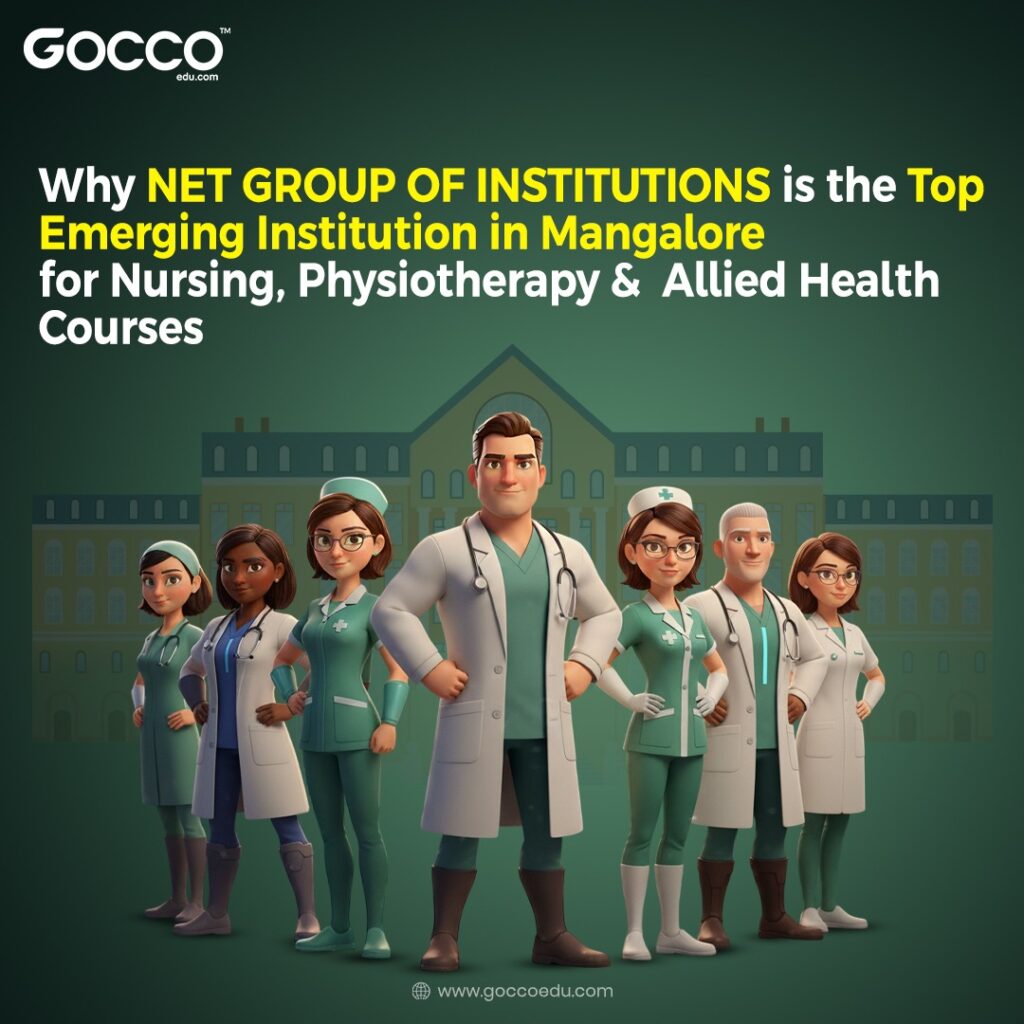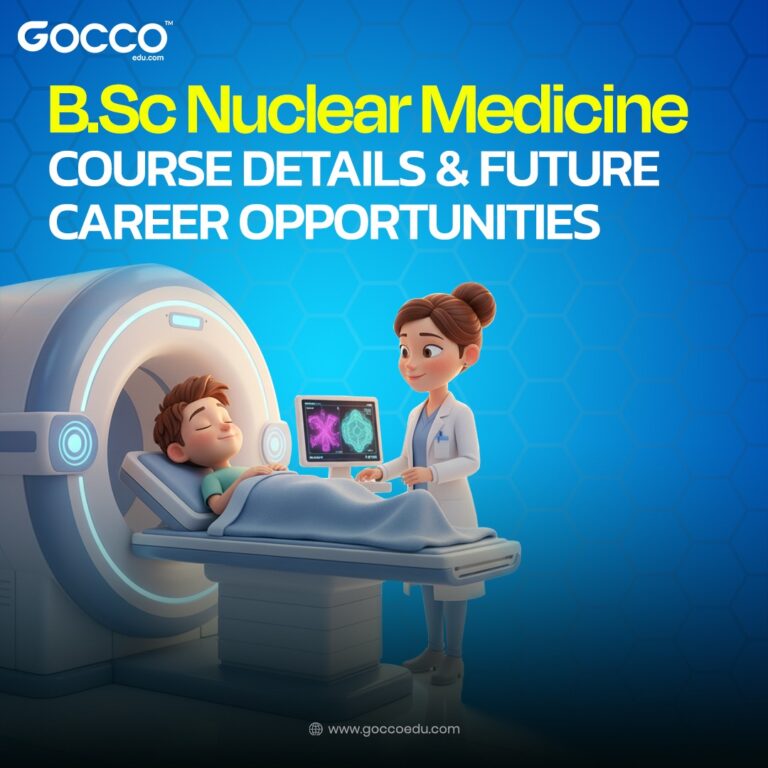Students who pursue BSc Nuclear Medicine become part of an innovative field where science meets healthcare. The BSc Nuclear Medicine course details highlight how this program is designed to equip students with the scientific knowledge, technical expertise, and clinical experience needed to work in diagnostic imaging, radiopharmacy, and therapeutic applications.
The scope of BSc Nuclear Medicine is vast, offering career opportunities in hospitals, research institutions, pharmaceutical companies, and advanced diagnostic centers. Let’s take a deeper look at the BSc Nuclear Medicine course details, scope, and career prospects.
BSc Nuclear Medicine Course Details
The BSc Nuclear Medicine course is a three-year undergraduate program under Allied Health Sciences that focuses on the use of radioactive substances in the diagnosis and treatment of diseases. The program blends theoretical education with practical training, preparing students for highly specialized roles in healthcare.
Here are the complete BSc Nuclear Medicine course details:
- Course Duration: 4 years (divided into 8 semesters)
- Eligibility Criteria: Candidates must have completed 10+2 with Physics, Chemistry, and Biology (PCB) as core subjects. Some universities may also accept students with Mathematics or Biotechnology.
- Course Type: Undergraduate degree in Allied Health Science
- Core Subjects:
- Radiation Physics and Instrumentation
- Radiopharmacy and Radiochemistry
- Human Anatomy and Physiology
- Nuclear Medicine Techniques
- Radiation Safety and Protection
- Clinical Applications of PET, CT, and SPECT Imaging
- Practical Learning: Students receive hands-on training in nuclear medicine laboratories and hospital departments, where they learn to handle radiopharmaceuticals, operate imaging equipment, and analyze patient scans.
- Skills Developed: Imaging technology, data interpretation, patient care, radiation safety, teamwork, and medical ethics.
By understanding these BSc Nuclear Medicine course details, students gain clarity about what to expect during their academic journey and how this program prepares them for diverse career paths in the healthcare industry.
Why Choose BSc Nuclear Medicine?
Choosing BSc Nuclear Medicine is ideal for students interested in combining science with real-world medical applications. This program not only provides academic knowledge but also builds technical proficiency and critical thinking skills.
Here are some reasons why this course stands out among other allied health programs:
- High Demand for Skilled Professionals:
With the increasing reliance on advanced diagnostic imaging, hospitals and research centers require qualified nuclear medicine technologists and radiopharmacists. - Technological Growth in Healthcare:
Nuclear medicine is one of the fastest-growing medical technologies worldwide, creating more job opportunities each year. - Global Career Opportunities:
A degree in BSc Nuclear Medicine is recognized internationally, opening doors to job roles in hospitals, diagnostic centers, and research institutes abroad. - Contribution to Patient Care:
Professionals in this field directly contribute to life-saving diagnoses and treatments, improving patient outcomes. - Strong Research Potential:
Students can advance into research and development, exploring innovations in radiopharmaceuticals and nuclear imaging technologies.
Scope of BSc Nuclear Medicine
The scope of BSc Nuclear Medicine is expanding rapidly across India and globally. It plays a crucial role in the early detection, diagnosis, and treatment of diseases such as cancer, heart disorders, neurological conditions, and thyroid problems. The increasing need for accurate imaging and noninvasive diagnostic procedures has made nuclear medicine professionals indispensable in modern healthcare.
Key areas of scope include:
- Diagnostic Imaging
Nuclear medicine technologists use advanced imaging systems like PET/CT and SPECT to visualize the internal functioning of organs. These scans help doctors identify diseases in their earliest stages, improving treatment outcomes.
- Therapeutic Applications
Professionals in this field assist in targeted radioactive treatments for medical conditions such as thyroid disorders and cancers. This precision-based therapy reduces side effects and enhances recovery rates.
- Research and Development
Graduates can engage in R&D roles in medical institutions or pharmaceutical industries, focusing on improving imaging agents, diagnostic methods, and safety standards.
- Radiopharmacy
Radiopharmacists specialize in the preparation and quality assurance of radiopharmaceuticals used in imaging and therapy. Their role ensures the safe and effective use of radioactive substances.
- Radiation Protection and Safety
BSc Nuclear Medicine graduates are trained in radiation safety procedures to protect both patients and healthcare workers from unnecessary exposure.
With the continuous advancement in imaging technology and precision medicine, the scope of BSc Nuclear Medicine is expected to grow further, creating numerous opportunities for skilled professionals.
Career Opportunities in Nuclear Medicine
After completing BSc Nuclear Medicine, graduates can work in a wide range of medical and scientific roles. The program offers excellent job stability and competitive salaries across the government and private healthcare sectors.
Top career opportunities include:
- Nuclear Medicine Technologist: ₹3–6 lakhs per annum
- Operates imaging equipment like PET/CT scanners and assists doctors in diagnosing diseases.
- Radiopharmacist: ₹5–8 lakhs per annum
- Prepares, tests, and ensures the quality of radiopharmaceuticals used in diagnostics and treatment.
- Research Scientist: ₹4–7 lakhs per annum
- Works on developing new imaging technologies and improving therapeutic methods.
- Medical Physicist: ₹6–10 lakhs per annum
- Applies physics principles to optimize imaging quality and ensure radiation safety.
- Radiation Safety Officer: ₹5–9 lakhs per annum
- Responsible for implementing safety protocols in hospitals and labs using radioactive materials.
The demand for professionals trained in BSc Nuclear Medicine is increasing in India and abroad, ensuring a secure and rewarding career path.
Top Recruiters in Nuclear Medicine
Graduates from BSc Nuclear Medicine programs can find employment in a variety of organizations, including:
- Hospitals and Diagnostic Centers (Apollo, Fortis, AIIMS, Tata Memorial, and Manipal Hospitals)
- Research Institutions (BARC, ICMR, DRDO, and private R&D labs)
- Pharmaceutical and Radiopharmaceutical Companies (GE Healthcare, Siemens Healthineers, and Jubilant Pharma)
- Nuclear Medicine Centers and academic institutions
Many graduates also pursue higher education, such as an MSc in Nuclear Medicine Technology or Medical Physics, which can lead to advanced research or teaching careers.
Future of BSc Nuclear Medicine
The future of BSc Nuclear Medicine looks incredibly promising. With the continuous growth in nuclear imaging, cancer therapy, and molecular diagnostics, professionals in this field will remain in high demand. India’s healthcare infrastructure is also evolving, with more hospitals establishing nuclear medicine departments.
Additionally, the emergence of AI-based imaging and radiopharmaceutical innovation will create new opportunities in diagnostics and precision therapy. Graduates with strong technical knowledge and hands-on experience can expect global career growth in the coming years.
Conclusion
BSc Nuclear Medicine is an innovative and future-driven medical course that blends science and technology to improve healthcare outcomes. By understanding the BSc Nuclear Medicine course details, students can make informed decisions about pursuing this rewarding field. The course offers a strong foundation in diagnostic imaging, therapeutic applications, radiopharmacy, and research, leading to numerous career opportunities in hospitals, research centers, and pharmaceutical industries.
As healthcare continues to advance, the demand for skilled nuclear medicine professionals will only increase, making BSc Nuclear Medicine one of the most promising allied health courses in India and abroad. For students looking to build a career in a technologically advanced and life-saving domain, BSc Nuclear Medicine is undoubtedly a perfect choice.




